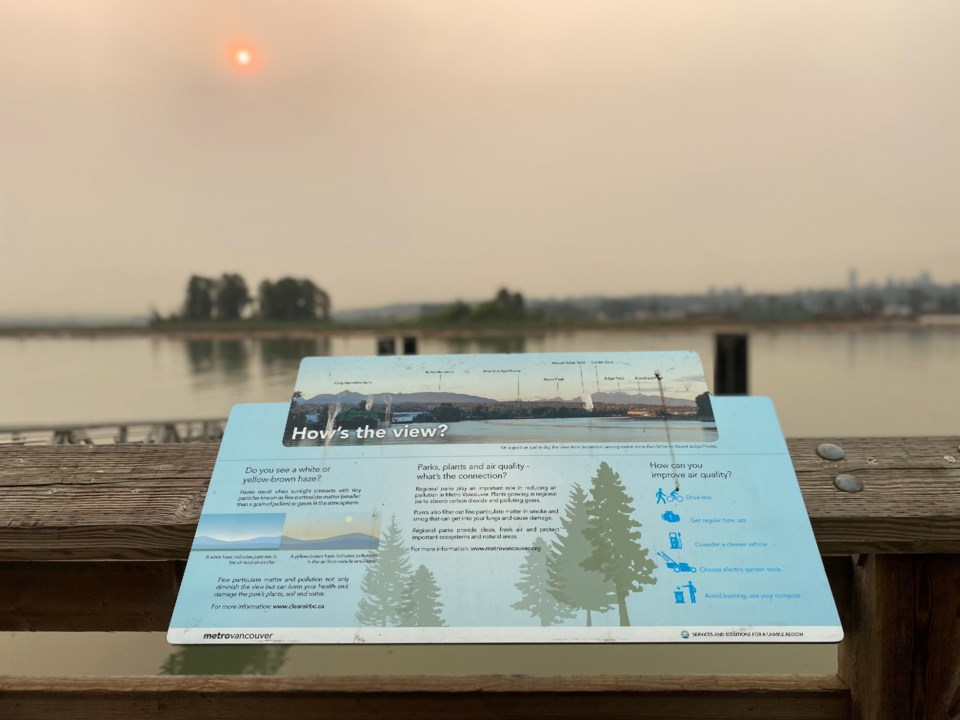What happens when you have an air quality advisory, an extreme heat alert and a pandemic all happening simultaneously?
A lot of complications.
Medical health officers are advising Lower Mainland residents to take precautions against the significant wildfire smoke that’s rolled in over the region and the soaring temperatures that have come along with it.
A Fraser Health press release indicates that access to cooling centres is taking precedence over pandemic protocols. It notes that, while the extreme heat alert is in place:
- Cooling centres will be open, and no one should be denied access to these centres because of concerns about crowding or physical distancing.
- If people are wearing a mask and have difficulty breathing, they should remove the mask, whether they are indoors or outside, as wearing a mask may impact thermal regulation during heat events.
HEAT SAFETY TIPS
The release also recommends a number of steps people should take during the extreme heat:
- Conduct regular checks on vulnerable people: Individuals who live alone, particularly seniors, are at high risk of heat-related illness. Check in regularly to ensure they have no symptoms. If you identify signs of illness, assist in moving them to a cooler indoor or shaded space, support them in getting hydrated and seek medical assistance. If urgent medical support is required, call 9-1-1 without delay.
- Access other air-conditioned spaces: Seek out an air-conditioned facility (such as a shopping centre, library, community centre, restaurant, or a residence of friends or family).
- Use public splash pools, water parks or pools or take a cool bath or shower.
- At high temperatures, fans alone are not effective. Applying cool water mist or wet towels prior to sitting in front of a fan is a quick way to cool off.
- Keep your home cool: Open windows, close shades, use an air conditioner (if you have one) and prepare meals that do not require an oven.
- Avoid tiring work or exercise in the heat: If you must exercise or conduct strenuous work, drink two to four glasses of non-alcoholic fluids each hour. Limit daytime outdoor activity to early morning and evening time.
- Stay hydrated: Drink cool, non-alcoholic beverages (preferably water) irrespective of your activity intake; don't wait until you are thirsty. If your doctor generally limits the amount of fluid you drink or you take water pills, ask about increasing the amount of water you can drink while the weather is hot.
- Keep pets and children cool: Never leave children or pets alone in a parked car. Temperatures can rise to 52°C (125°F) within 20 minutes in an enclosed vehicle when the outside temperature is 34°C (93°F).
- Dress for the weather: Wear loose, lightweight clothing. Protect yourself from the sun by wearing a wide-brimmed hat and sunglasses.
- Avoid sunburn: Stay in the shade or use sunscreen with SPF 15 or more.
- Seeking care: For critical, life-threatening conditions, please call 9-1-1 or go to the nearest emergency department. This includes anyone experiencing difficulty breathing, shortness of breath or chest pain.
- For other non-life-threatening matters, there are a number of options to seek care during the summer. Urgent and Primary Care Centres (UPCCs) are open evenings and weekend, seven days a week and provide care for unexpected, non-life-threatening health concerns that require treatment within 48 hours. If you are unsure where to seek care, please call 8-1-1 or your family physician.
(source: Fraser Health)
BUT THE SMOKY AIR …
The advice to “open windows” may come with complications for those who don’t want to let the smoky air into their homes.
Metro Vancouver is advising people to:
- Stay in cool, air-conditioned environments, especially during the afternoon and early evening when ozone levels are highest.
- Reduce indoor sources of pollution such as smoking and vacuuming, and run an air cleaner. Some room air cleaners, such as those with HEPA filters, can help reduce indoor particulate levels provided they are the right size for your home and filters are changed regularly.
- Consider taking shelter in air-conditioned buildings which have large indoor volumes and limited entry of outdoor air, but be aware that space may be limited due to physical distancing guidelines for COVID-19 and any COVID-19 protocols must be observed.
(source: Metro Vancouver)
COOLING CENTRES
For New Westminster residents, the best answer for those with non-air-conditioned homes is likely to seek an air-conditioned space to spend time. The city is offering four cooling centres:
Century House:
620 Eighth St. Hours of operation are 24/7 (bring your own pillow and blanket if you want to sleep there)
Pets welcome* (Pets and their owners will be in a separate area)
Queensborough Community Centre
920 Ewen Ave., Noon to 9 p.m.
Pets welcome*
Anvil Centre
777 Columbia St.
Aug. 12 to 14, noon to 9 p.m.
Pets welcome*
New Westminster Public Library
716 Sixth Avenue
Extended hours Aug. 12 to 14, 10 a.m. to 9 p.m.
No pets
*Pet owners should bring necessary supplies such as food, poop bags, etc. Pet owners are encouraged to bring travel crates to house their pets.
For the latest details about cooling centres, watch the city's website.
Follow Julie MacLellan on Twitter @juliemaclellan.
Email Julie, [email protected].



